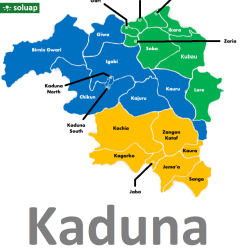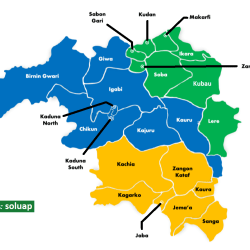Lagos, Nigeria’s top business destination, has 5 divisions, 20 local government areas, 37 local council development areas and, 40 state assembly constituencies.
The 5 administrative divisions of Lagos are Ikeja, Badagry, Ikorodu, Lagos [Eko] and Epe.
The divisions were created in May 1968 by virtue of Administrative Divisions [Establishment] Edict No. 3 of April 1968.
The Lagos divisions are further divided into 20 Local Governments and 37 Local Council Development Areas.
Lagos divisions, local government areas, local council development areas and communities
Ikeja
LGAs:
Agege, Ifako-Ijaiye, Kosofe, Mushin, Alimosho, Oshodi-Isolo, Somolu and Ikeja
LCDAs:
Agbado/Oke-Odo, Agboyi-Ketu, Ayobo-Ipaja, Bariga, Egbe-Idimu, Ejigbo, Igando-Ikotun, Ikosi-Isheri, Isolo, Mosan-Okunola, Odi Olowo-Ojuwoye, Ojodu, Ojokoro, Onigbongbo and Orile Agege.
Communities:
Isolo, Isheri-Oshun, Ikotun, Isheri-Olofin, Meiran, Ejigbo, Egan, Ketu, Ojota, Shangisha, Oworonshoki,Mushin, Abesan, Magodo, Egbe, Igando, Idimu, Ayobo, Iju, Ifako, Abule Egba, Agboyi, Ikosi, Okota, Somolu, Ipaja, Abesan, Abesan, Oregun, Isheri-Oke, Oshodi, Oke-Afa, Ojodu, Ogudu, Bariga, Ilupeju, Obanikoro, Akowonjo, Agege, Ijegun, Alagbado, Aboru, Olota, Ojokoro, Ikola, Ajasa, Baruwa, Ewu, Abule-Onigbagbo, Odi-Olowo, Shasha, Mende, Ipodo and Alimosho.
Ikeja, a predominantly Awori enclave and the cradle of its civilization, consists of eight local government authorities namely: Agege, Ifako-Ijaiye, Kosofe, Mushin, Alimosho, Oshodi-Isolo, Somolu and Ikeja which serves as both the seat of the State Government and the divisional headquarters.
The LCDAs include Agbado/Oke-Odo, Agboyi-Ketu, Ayobo-Ipaja, Bariga, Egbe-Idimu, Ejigbo, Igando-Ikotun, Ikosi-Isheri, Isolo, Mosan-Okunola, Odi Olowo-Ojuwoye, Ojodu, Ojokoro, Onigbongbo and Orile Agege.
Ikeja is the state capital and administrative center of Lagos State Government.
The division has a concentration of both medium and large scale industries within the Mushin-Isolo-Oshodi and greater Ikeja industrial complex, while also having a large agricultural area in its rural Alimosho, Kosofe and Agege districts.
A fledging Central Business District [Alausa/Agidingbi] and Nigeria’s biggest and busiest international airport [Murtala Mohammed Airport] are situated in the divisional headquarters, Ikeja.
There are over fifty settlements in the division notable among which are: Isolo, Isheri-Oshun, Ikotun, Isheri-Olofin, Meiran, Ejigbo, Egan, Ketu, Ojota, Shangisha, Oworonshoki,Mushin, Abesan, Magodo, Egbe, Igando, Idimu, Ayobo, Iju, Ifako, Abule Egba, Agboyi, Ikosi, Okota, Somolu, Ipaja, Abesan, Abesan, Oregun, Isheri-Oke, Oshodi, Oke-Afa, Ojodu, Ogudu, Bariga, Ilupeju, Obanikoro, Akowonjo, Agege, Ijegun, Alagbado, Aboru, Olota, Ojokoro, Ikola, Ajasa, Baruwa, Ewu, Abule-Onigbagbo, Odi-Olowo, Shasha, Mende, Ipodo and Alimosho.
Badagry
LGAs:
Ojo, Amuwo-Odofin, Ajeromi-Ifelodun, and Badagry
LCDAs :
Iba, Ifelodun, Olorunda, Oriade, Badagry West and Oto-Awori.
Communities
Badagry, Ajara [a collection of villages], Iworo, Ajido, Akarakunmo, Gbaji, Aseri, Egan, Agonrin, Ahanve, Epe, Pota, Mowo, Itoga, Shibiri, Ekunpa, Aradagun, Kankon, Mosafejo, Gayingbo-Topa, Apa, Moba, Ropoji, Oranyan, Tafi-Awori, Yeketome, Pota, Seme, Iyagbe, Ajegunle, Aiyetoro, Festac Town and Satellite Towns, Iba, Kirikiri, Agboju-Amuwo, Okokomaiko, Ojo, Amukoko, Alaba-Oro, Ijofin, Igbanko, Imore, Ijegun, Ibeshe, Oto, Ijanikin, Ilogbo Eremi, Ilado, Abule-Ado and Odan
Badagry division is a zone of culture mix between the Ogu and Awori as well as an international border region.
The original name of Badagry, Gbagi, a contraction of the word ‘Ogbagleme’ means a ‘farmland near the swamp’ in Ogu language. The word, ‘Ogbagleme’ was later coined to Agbadarigi by Yoruba settlers and later corrupted to Badagry by the Europeans.
It consists of four Local Governments, including: Ojo, Amuwo-Odofin, Ajeromi-Ifelodun, and Badagry as well as six Local Council Development Areas namely: Iba, Ifelodun, Olorunda, Oriade, Badagry West and Oto-Awori. Badagry serves as the divisional headquarters.
Being a coastal town on the western littoral, Badagry was a major slave outpost and market during the pre-colonial era.
Badagry was the entry point of Christianity in Nigeria being the place where the Bible was first preached in 1842, under the Agia Tree.①
Major settlements in the Division include: Badagry, Ajara [a collection of villages], Iworo, Ajido, Akarakunmo, Gbaji, Aseri, Egan, Agonrin, Ahanve, Epe, Pota, Mowo, Itoga, Shibiri, Ekunpa, Aradagun, Kankon, Mosafejo, Gayingbo-Topa, Apa, Moba, Ropoji, Oranyan, Tafi-Awori, Yeketome, Pota, Seme, Iyagbe, Ajegunle, Aiyetoro, Festac Town and Satellite Towns, Iba, Kirikiri, Agboju-Amuwo, Okokomaiko, Ojo, Amukoko, Alaba-Oro, Ijofin, Igbanko, Imore, Ijegun, Ibeshe, Oto, Ijanikin, Ilogbo Eremi, Ilado, Abule-Ado and Odan Group of Villages [Soba, Onireke, etc].
Ikorodu
LGA:
Ikorodu
LCDAs:
Igbogbo-Baiyeku, Ikorodu North, Ikorodu West, Imota and Ijede.
Communities:
Ijebu, Remo, Ikorodu, Egbin, Igbogbo, Imota, Ijede, Maya Adio, Odogunyan, Isiu, Igbokuta, Ewu-Elepe, Baiyeku, Oreta, Ofin, Gberigbe, Erikorodo, Igbalu, Ibese, Ebute, Majidun, Itowolo, Eko-Awori.
Ikorodu lies approximately 36 km north of Lagos.
Ikorodu derives its name from ‘Oko-Odu’ meaning vegetable farm.
This farmland was the first place where Oga, the crown prince of a Remo King and supposed founder of the town settled hence, the reference to the town as Ikorodu Oga.②
The Division consists of Ikorodu Local Govenment, and five Local Council Development Areas including: Igbogbo-Baiyeku, Ikorodu North, Ikorodu West, Imota and Ijede.
By virtue of its location, the Division serves as the gateway to the country’s hinter-land.
It is also an active commercial/energy center and national broadcasting gangway as the transmitters of the Federal Radio Corporation of Nigeria [FRCN], Voice of Nigeria [VON] and those of the State Broadcasting Corporation, [Radio Lagos/Eko F.M. and LTV], are located there.
The population of the Ikorodu consists of predominantly of the Ijebu and Remo groups that inhabit Ikorodu, Egbin, Igbogbo, Imota, Ijede, Maya Adio, Odogunyan, Isiu, Igbokuta, Ewu-Elepe, Baiyeku, Oreta, Ofin, Gberigbe, Erikorodo and Igbalu.
However, along the riverine fringes of Ipakodo, Ibese, Ebute, Majidun, Itowolo, and other coastal communities, there is a strong presence of Eko-Awori population.
The indigenes of Ikorodu Division are mostly traders and farmers with fishing thriving mostly along the Lagos Lagoon foreshore on the Cradoo [Ikorodu] Lake waterfront, Ipakodo, where a Nigerian Ports Authority Lighter Port Terminal is situated.
Lagos [Eko]
LGAs:
Lagos Island, Lagos Mainland, Surulere, Apapa and Eti-Osa
LCDAs:
Lagos Island East, Yaba, Itire-Ikate, Coker-Aguda, Ikoyi-Obalende, Apapa-Iganmu, Eti-Osa East and Iru/Victoria Island
Communities:
Tarkwa Bay, Victoria Island, Iru, Lagos Island, Ikoyi, Obalende, Oto, Ijora, Apapa, Ebute-Meta, Yaba, Ido, Sangotedo, Mayegun, Ogombo, Ogoyo, Okun-Ibeju, Moba, Alaguntan, Itire, Coker-Aguda, Ikate-Elegushi, Ajiran, Ilasan, Tomaro, Abagbo, Igbo-Ejo [Snake Island], Ado, Langbasa, Ilasan, Igbo-Efon, Ikota
Lagos metropolis is the core of Lagos State and a highly urbanized area. It consists of five Local Government Councils, vis: Lagos Island, Lagos Mainland, Surulere, Apapa and Eti-Osa, as well as eight Local council development areas which include: Lagos Island East, Yaba, Itire-Ikate, Coker-Aguda, Ikoyi-Obalende, Apapa-Iganmu, Eti-Osa East and Iru/Victoria Island with the City of Lagos being the pivot of an ever expanding Megacity and the divisional headquarters.
The center and the most developed of this island chain, Lagos Island, is called ‘Eko’ by the indigenes.
The name ‘Lagos’ is a derivative of a Portuguese imposition of ‘Lagos de Curamo’ or ‘Rio Lago’ on account of its wetland topography and network of lagoons.
The Island is the cultural watershed of the White Cap [Idejo] Chieftaincy and metropolitan Lagos with the Oba of Lagos as the paramount monarch and primus inter pares of the State traditional authorities.
Lagos is the chief commercial, financial and maritime nerve-center of Nigeria with seaports at Apapa, Tin Can Island, Roro Terminal Ports and Ijora Container Terminal. It has an ever-expanding Central Business Disrict in Tinubu and Victoria Island.
As the economic capital and major port of Africa’s most populous nation, Lagos has attracted immigrants from all over Nigeria and beyond, as well as commercial entrepreneurs and industries from Africa, Europe, Asia and the Americas.
Major settlements in the Division are: Tarkwa Bay, Victoria Island, Iru, Lagos Island, Ikoyi, Obalende, Oto, Ijora, Apapa, Ebute-Meta, Yaba, Ido, Sangotedo, Mayegun, Ogombo, Ogoyo, Okun-Ibeju, Moba, Alaguntan, Ado, Langbasa, Ilasan, Igbo-Efon, Ikota, Itire, Coker-Aguda, Ikate-Elegushi, Ajiran, Ilasan, Tomaro, Abagbo, Igbo-Ejo [Snake Island], etc.

Epe
LGAs:
Epe, Ibeju-Lekki
LCDAs:
Lekki, Ikosi-Ejirin and Eredo
Communities:
Epe, Orugbo-Iddo, Agbowa-Ikosi, Ilara, Odo-Ayandelu, Odoragunsin, Igbooye, Naforija, Igbodu, Ejinrin, Poka, Itoikin, Idotun, Ita-Oko, Omi, Temu, Ise and Debojo. Others are Apawa, Aba-Titun, Abomiti, Afere, Apakin, Abalaye, Origanrigan, Kayetoro Eleko, Yeunda, Okunraye, Keta, Arapagi, Aiyeteju, Okun-Folu, Osoroko, Olomowewe, Ibeju, Lekki, Akodo, Otolu, Magbon-Alade, Oriba, Iwerekun, Iberekodo, Idado, Okun Igando-Orudu, Tiye, Awoyaya, Ote-Omi, Bogije, Siriwon, Idaso, Orimedu, Olorunkoya, Ojota, Ode-Ifa, Ofin, Igbesibi and Igbolomi, among others.
Epe is made up of two Local Government Councils, namely: Epe, Ibeju-Lekki while the three Local Council Development Areas are: Lekki, Ikosi-Ejirin and Eredo with Epe serving as the divisional headquarters. It lies about 89kms north-east of the City of Lagos.
Urakaloye was the man said to be the ancestral founder of Epe, a name derived from black ants, which invaded Urakaloye’s hunting homestead. Hence, the town’s name, Epe, means the forest of black ants.
Epe Division consists of Epe, Orugbo-Iddo, Agbowa-Ikosi, Ilara, Odo-Ayandelu, Odoragunsin, Igbooye, Naforija, Igbodu, Ejinrin, Poka, Itoikin, Idotun, Ita-Oko, Omi, Temu, Ise and Debojo. Others are Apawa, Aba-Titun, Abomiti, Afere, Apakin, Abalaye, Origanrigan, Kayetoro Eleko, Yeunda, Okunraye, Keta, Arapagi, Aiyeteju, Okun-Folu, Osoroko, Olomowewe, Ibeju, Lekki, Akodo, Otolu, Magbon-Alade, Oriba, Iwerekun, Iberekodo, Idado, Okun Igando-Orudu, Tiye, Awoyaya, Ote-Omi, Bogije, Siriwon, Idaso, Orimedu, Olorunkoya, Ojota, Ode-Ifa, Ofin, Igbesibi and Igbolomi, among others.
A peculiar feature of Epe is the presence of a long range of hills, which demarcates the coastal town into equal parts. However, in Ibeju-Lekki, artisanal fishing, sandy beach and coconut fringed Atlantic coastlines are distinctive features of the environment which has enormous tourism potentials.
Fishing and farming form the major occupations of the inhabitants of the Division, which also includes the Eko Aworis.
Reference
① ② lagosstate.gov.ng


